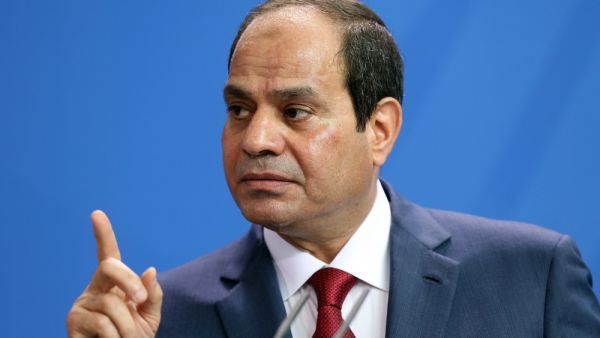Egypt worries recent unfavourable US statements and stances towards Saudi Arabia could be a harbinger of a clash to come with Washington.
According to analysts, Cairo expects to be next on the list of countries to draw the critical attention of the US administration of President Joe Biden. This attention is likely to focus on Egypt's human rights stances, especially as Cairo has no axe to grind with Washington on foreign policy issues.
Washington has so far getting avoided mired in complex Middle East files, such as the ongoing conflicts in Syria and Libya, since the time of the Barack Obama administration, which failed to deal with these hot issues.
Egypt's El Sisi confident of reaching agreement on Ethiopia's Nile dam https://t.co/Cl9RFfHda5
— The National (@TheNationalNews) February 7, 2021
Washington is devoting less attention to conflicts while increasing talk about injustices and human rights. This could suggest an intent to target countries it sees as having enjoyed a free ride under the administration of former President Donald Trump.
The Biden foreign policy team, which seems intent on focusing on Egypt, especially its human rights record, and the Muslim Brotherhood files, seems bent on correcting what it sees as Trump's mistakes and reproducing Obama-era policies in the Middle East.
In an op-ed published Sunday in The Wall Street Journal, Michael Doran, a senior fellow at the Hudson Institute who previously served in the George W. Bush administration, said Biden is toeing an "abnormal" foreign policy in the Middle East, as he "revives the Obama policy of strengthening America’s enemies and harming its friends."
"Abandoning containment, gutting deterrence, squandering leverage, downgrading allies and enriching enemies—these are the essential components of the Obama-Biden strategy. For a superpower to embrace such an approach isn’t only abnormal; it is alarming, " said Doran.
Such projections reinforce Egypt's concerns that the Biden administration might seek to address human rights in Egypt in their wider context and not just raise specific cases of activists. The US approach is likely to encompass Cairo's whole approach to the Muslim Brotherhood. This would also mean shedding a different light on human rights issues and their connection to the fight against terrorism.
Islamism expert Tariq Abu Al-Saad expressed his belief that the human rights focus could be a prelude to bringing the Muslim Brotherhood issue to the fore given the intense investment in this issue by Brotherhood leaders and sympathisers and political activists who have endeavoured to cultivate the image of a politically persecuted group that is far removed from the documented violent activities of the last few years.
UPDATE: #Egypt’s #Sisi reiterates trust in #AU role in helping resolve #GERD issue https://t.co/971cj3T3Vs via @ahramonline
— Ahram Online (@ahramonline) February 6, 2021
Saad told The Arab Weekly, "The Biden administration realises that this is the most potent card that enables it to exert pressure on Cairo in pursuit of US goals, and may at some point in the future become the determining factor in the Egyptian-American relationship."
Talk about Brotherhood-related issues was politically muted during the Trump years. Cairo was at ease with US policy on the matter, which it linked to the growing terrorist threat in the region.
Egypt tried to take advantage of developments in countries such as France and Austria, which decried the Brotherhood’s involvement with extremist organisations in Europe, going along the main arguments of an Egyptian narrative that had previously not been widely shared in the West.
In dealing with the Biden administration, the Egyptian regime faces the crucial challenge of establishing a solid link between the Brotherhood and terrorist groups. It will be a difficult case to make with a Democratic administration that has preset notions, mostly unfavourable, about such a perspective. This might compel Cairo to work with other partners and get ready to re-open the Brotherhood file at home.
Cairo is striving to redefine the individual cases issues at hand. But from Washington's vantage point, the individual cases of activists could be the prelude to bringing up the larger file of the Brotherhood, including the fate of the Islamist leaders in jail and the political role of the movement's cadres.
Washington will not mind setting aside the strategic issues in dealing with Cairo to invest first in the file of human rights and its political ramifications. Analysts see this focus as yielding great moral dividends for Washington and strengthening the impression of a return to Obama's policies.
Egyptian President Abdel Fattah al-Sisi gives the impression of being aware of what is going on as he intensifies his appeals to the people to stand behind the regime. The last instance was his appeal to the public last Saturday evening during a television programme to be cautious of the risk of a “foreign conspiracy” targeting the country and feeding on domestic tensions. Sisi seemed to be trying to send a message that he enjoyed the people's protection.
Some analysts argue that Egypt has changed and the regime now enjoys a more solid base at home, which reduces the impact of American pressure unlike during the last years of the Obama era, when the Egyptian regime was less cohesive.
They also believe that the human rights issue will remain contentious, even if Cairo improves parts of its record. Steps have been taken during the last period towards this end. Related decisions included issuing executive regulations for the implementation of the law on NGOs, legalising the work of human rights organisations and releasing hundreds of detainees. These moves, however, were not widely lauded by NGOs. Instead, human rights organisations and the European Union may find in Biden’s attention to the issue an additional incentive to apply more pressure on the Egyptian government.
Cairo has two options in dealing with the Brotherhood issue. One is to try to establish a link between the Islamist organisation and terrorism. This option is unlikely to make headway in light of the West's wavering positions and the Biden administration’s commitment to using the issue according to its agenda and avoiding the pitfalls of the Obama administration. The other option is to accept reconciliation with the Brotherhood, which is quite difficult right now, as the Egyptian regime has pinned its political legitimacy, at least in part, on its hostility to the Brotherhood.
Large segments of the population are unlikely to accept this option. It could instead trigger confrontation, an outcome Cairo wants to avoid.
Experts of political Islam point out that the Egyptian response, if there is any, will be limited to some cases that do not cause public embarrassment for the regime and will not include alleged perpetrators of terrorist acts or figures associated with incitement and violence.
This article has been adapted from its original source.








